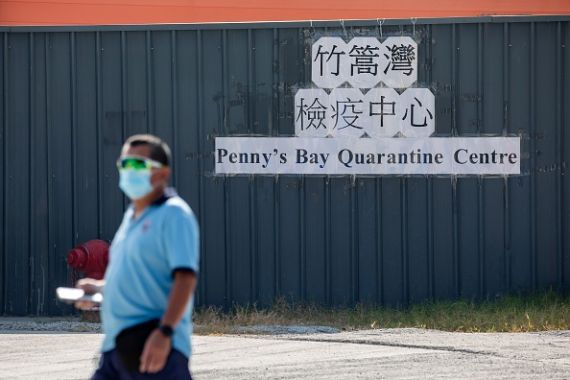Hong Kong says Omicron has spread locally despite strict rules
The city has largely isolated itself in the hope of containing the highly transmissible coronavirus variant.

Officials in Hong Kong say the Omicron variant of the coronavirus has spread within the community, despite some of the world’s strictest containment measures, with the city reporting its first cases outside its strict quarantine system.
Health Secretary Sophia Chan told reporters on Friday that one of four aircrew members who tested positive after their return to Hong Kong had breached home quarantine rules by going to a restaurant, where he passed the virus to his father and a client sitting at another table.
Keep reading
list of 3 itemsOmicron is sending thousands of children to US hospitals
Omicron main COVID variant in France
“Omicron is raging around the world … and it has now found its way into the community,” Chan said.
Health official Dr Chuang Shuk-kwan told reporters a different airline worker, who tested positive but was previously thought to have stayed at home, had visited a bar in a crowded nightlife district shortly after their latest flight back.
The global financial hub has been coronavirus-free for extended periods since the pandemic began. The last COVID-19 case tracked outside its quarantine facilities and hotels was discovered in October. Previous infections with the Omicron variant were discovered during quarantines of people returning to Hong Kong.
Hong Kong has largely isolated itself from the world hoping, in turn, to open the border with mainland China for a limited number of business travellers. Across the wider region, mainland China and New Zealand have also doubled down on existing ultra-strict border controls, while countries including Japan, South Korea, Singapore, Malaysia, Indonesia and Thailand have reintroduced tough travel curbs in response to the highly infectious Omicron variant.
In an interview with Al Jazeera, Philip Goh, the regional head of the International Air Transport Association, said the recent tightening of borders across Asia was only a “temporary speed bump” on the road to recovery and said the region will reopen to travel as more is learned about Omicron, which is believed to be more transmissible than the Delta variant but it has also been associated with milder illness.
In Hong Kong, authorities this week tightened quarantine rules for aircrew, extending the isolation period to one week in a hotel room from three days.
Flight crews had been allowed to quarantine at home, unlike most people returning to the city who have to quarantine in hotels for up to 21 days at their own cost.
Pilots had expressed worries about their mental health amid prolonged periods of isolation even before the tightening of measures.
Hong Kong’s Cathay Pacific Airways said on Thursday the new measures had forced it to cancel a significant number of passenger and cargo flights due to staff shortages.
The airline said on Thursday it would suspend long-haul flights to Europe, across the Pacific and to Riyadh and Dubai through January 6.
Less than 70 percent of its eligible population has taken two shots of either China’s Sinovac or Germany’s BioNTech vaccines. Only about 5 percent of people have received a third booster shot.